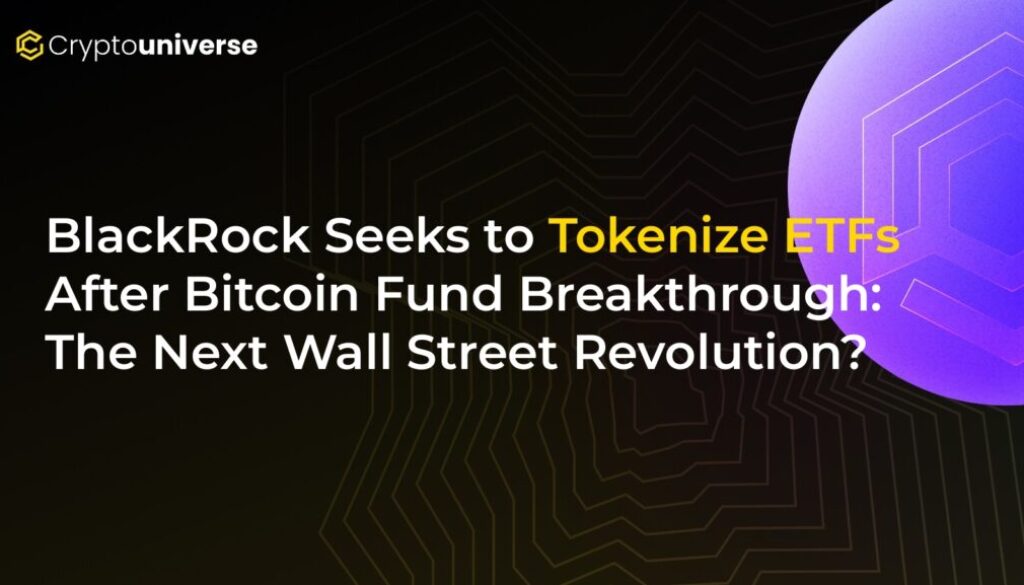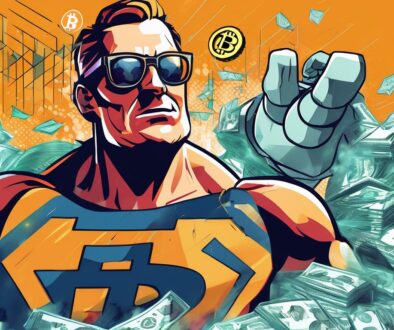BlackRock Seeks to Tokenize ETFs After Bitcoin Fund Breakthrough: The Next Wall Street Revolution?

Wall Street’s Titan Eyes a Digital Future for ETFs
Fresh off the monumental success of its spot Bitcoin ETF, BlackRock, the world’s largest asset manager, is setting its sights on the next frontier: the tokenization of traditional financial assets. According to recent reports, the financial giant is actively exploring ways to convert its Exchange-Traded Funds (ETFs) into digital tokens on the blockchain, a move that could fundamentally reshape the landscape of investing.
This isn’t just a fleeting experiment. It’s a calculated step in a broader strategy championed by CEO Larry Fink, who has repeatedly stated that the future of finance lies in tokenization. After proving the massive institutional appetite for crypto-native assets with its IBIT Bitcoin fund, which has amassed billions in assets under management, BlackRock is now looking to apply the same underlying technology to Wall Street’s most popular investment products.
What is ETF Tokenization, and Why Does It Matter?
In simple terms, ETF tokenization is the process of creating a digital representation, or “token,” of a share in an ETF on a blockchain. Think of it as giving a traditional stock or bond fund a digital passport, allowing it to move freely and securely on the decentralized rails of Web3.
But why is this a potential game-changer? The implications are massive:
- 24/7 Global Markets: Unlike traditional markets that operate on a 9-to-5 schedule, blockchains never sleep. Tokenized ETFs could be traded around the clock, across borders, removing time-zone barriers and increasing market access for global investors.
- Enhanced Liquidity and Fractional Ownership: Tokenization makes it incredibly easy to divide assets into smaller pieces. This would allow investors to buy fractions of an ETF share, lowering the barrier to entry for high-value funds and boosting overall market liquidity.
- Unprecedented Transparency: Every transaction and ownership record can be immutably stored on the blockchain, offering a level of transparency that is difficult to achieve in the current financial system.
- Streamlined Operations: By using smart contracts, processes like trade settlement, dividend payments, and compliance checks can be automated. This reduces the need for costly intermediaries, cuts down on settlement times (from days to seconds), and minimizes the potential for human error.
Building on a Foundation of Success
BlackRock’s interest in tokenized ETFs is not happening in a vacuum. The firm has already dipped its toes into the world of Real-World Asset (RWA) tokenization with its BlackRock USD Institutional Digital Liquidity Fund (BUIDL). Launched on the Ethereum network, BUIDL is a tokenized money market fund that has already attracted over $1 billion in assets, demonstrating strong institutional interest in on-chain financial products.
The success of both the IBIT Bitcoin ETF and the BUIDL fund has provided a powerful proof-of-concept. It shows that BlackRock can navigate the complex regulatory environment and that there is significant demand for blockchain-based financial instruments from sophisticated investors. The move to
Larry Fink’s Vision: “Every Stock, Every Bond”
BlackRock CEO Larry Fink has been one of the most vocal proponents of tokenization on Wall Street. He has famously declared that “the next step going forward will be the tokenization of financial assets,” envisioning a future where “every stock, every bond” will be recorded on a shared ledger. This latest exploration into tokenized ETFs is a direct move toward making that bold vision a reality.
The Road Ahead: Hurdles and Opportunities
While the potential is immense, the path to a fully tokenized financial market is not without its challenges. The primary hurdle remains regulatory clarity. Financial watchdogs like the SEC will need to establish clear frameworks for how these digital assets are created, traded, and custodied.
Furthermore, the underlying blockchain technology must be robust, secure, and scalable enough to handle the volume of Wall Street. However, these are not insurmountable obstacles. They are the same challenges the crypto industry has been actively working to solve for years.
For the crypto and blockchain space, BlackRock’s continued push is the ultimate validation. It signals that the technology is no longer a niche interest but a core component of the future financial infrastructure. As the world’s largest asset manager builds bridges between traditional finance (TradFi) and decentralized finance (DeFi), it paves the way for a tidal wave of capital and innovation to flow into the ecosystem.
The message is clear: the convergence of Wall Street and Web3 is accelerating, and BlackRock is firmly in the driver’s seat.


